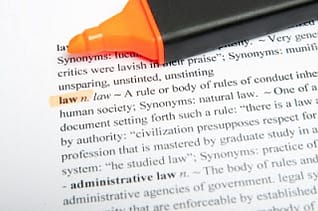
This new ongoing series of posts on the GFS Booth Blog will talk about the most frequently asked questions that our experts receive on the topic of code compliance and standards.
Our first question tackles the basics of the terminology used, and explains how ‘codes’ and ‘standards’ are not the same thing, but are highly dependent upon each other.
Q: What is the difference between a code and a standard?
A: A code tells you WHAT you need to do and a standard tells you HOW to do it.
A Code, such as the IFC (International Fire Code) or NFPA 1 (Fire Code), is the main regulatory documentation that sets minimum requirements. Codes are not necessarily authored by technical experts, they need not achieve a consensus prior to finalization, and they may incorporate all or part of a Standard. A Code is not a law, but can be adopted into law.
A Standard is authored by an organization that has expertise on a particular subject, such as NFPA. It serves as a model or set of rules that knowledgeable people recommend for others to follow. Standards also should be considered minimum requirements. Simply “meeting the standard” may not imply the “best” since the standard may have had to be reduced to some level in order to achieve the consensus.
In the paint finishing industry we have several codes and standards that apply to the design, construction, performance, and use of the equipment. They are the set of codes published by the International Code Council (ICC) and the set of codes and standards published by the National Fire Protection Association (NFPA).

Codes and standards can change from year to year. It is ultimately up to the State or local jurisdiction to adopt a certain Code or Code Revision. Although your State or local jurisdiction may be at a lower code adoption level, you may still want to comply and build to the latest suggested code or standard, especially if requirements have become more restrictive
We all should recognize the value of the codes and standards as a means to protect our lives and our livelihood.
Geoff Raifsnider
GFS Engineer, Member of NFPA 33 Technical Committee
One of the best ways to highlight your business is through a story that you can share across your online platforms. It humanizes your business and shows that your business can make a meaningful impact. Your testimonial would be used as a project profile on the GFS Booth Blog and can be shared on your website and/or social media channels.
Complete this form and we’ll be in touch to showcase your company.

Shop a variety of GFS aftermarket products, including booth protection products and mobile accelerated curing units. And enjoy the convenience of fast and free ground shipping throughout the contiguous United States.

Located at GFS’ headquarters in Osseo, Wisconsin, the Center for Excellence is an innovative facility featuring an automotive refinish training center, as well as a separate space dedicated to technical product training.

GFS is continuously searching for talented, ambitious individuals to join our team. We aim to provide our employees with every opportunity to make an impact on the company and find their niche along the way — weather in a production, field services or an office position.